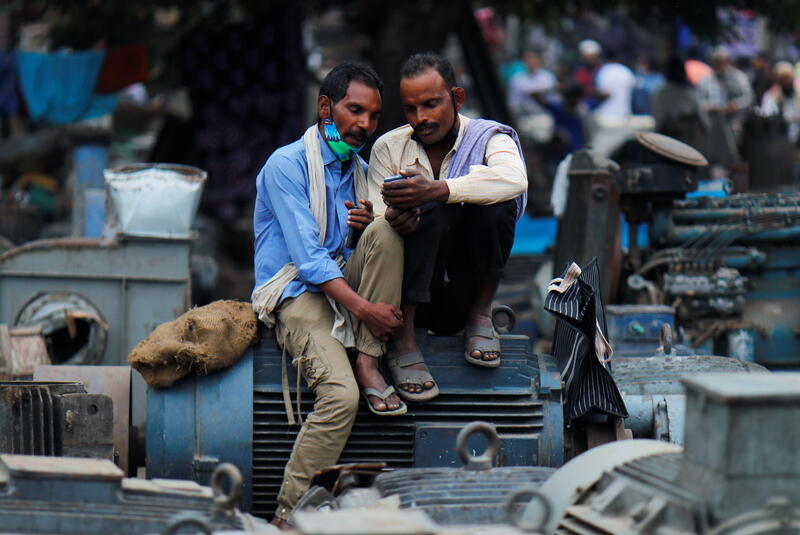Our podcast: what drives trust in news and what can be done to rebuild it

Men look at a mobile phone in Delhi, India, November 2020. REUTERS/Adnan Abidi
The topic
In this episode of our Future of Journalism podcast, two authors of the first report from our Trust in News Project discuss how partisanship, transparency and other factors may contribute to trust in news, and what outstanding questions need exploring such as the effect of platforms and social media on trust.
The guests
Our host is Federica Cherubini the Head of Leadership Development at the Reuters Institute.
Dr Benjamin Toff is a Senior Research Fellow at the Reuters Institute and leads the Trust in News Project. He retains a partial faculty appointment at the Hubbard School of Journalism & Mass Communication at the University of Minnesota.
Dr. Camila Mont'Alverne is a Postdoctoral Research Fellow at the Reuters Institute working on the Trust in News Project.
Listen to the podcast
Spotify | Apple Podcasts | Google Podcasts
Transcript
On the Trust in News Project ↑
Ben: Trust in news is a complex series of challenges that's been studied to a great extent primarily in places like the United States and a handful of other countries. Our focus is much more international; we are focusing specifically on the US, the UK as well as Brazil and India, two countries that have received much less attention when it comes to subjects like this. So, we’re hoping to gather a lot more data from the audience perspective about how people think about these issues, think about the news organisations that they have access to within their countries.
And then hopefully gather some data as well on what can actually be done about it to change people’s trust in the organisations that they read or watch or listen to. One of the major challenges that we heard from talking to the journalists and news organisations that we talked to for this report is that there’s just not a lot of data about what works and what doesn’t work when it comes to different efforts to address these issues. So, that’s the other thing that we’re really hoping to do with this project, is gather some empirical data about what might be done about some of the challenges that are chronic and ongoing.
On what 'trust in news' means ↑
Camila: The issue is that when we talk about trust in news, we need to define a lot of things. For example, what is meant by trust, whose trust are we talking about, and what news? Since people have different ideas about how journalism works, these ideas can be a little bit conflicting to what they expect from it. And the notions about the reality and what is happening in the world also changes.
So, we need to define those things when we are talking about trust in news, to make sure that we have an approach that is actually going to be useful for coping with the problems we’ve found. Because when we are seeking to retain trust in news, or even to build it, we need to be also specific about what we want to achieve and we have to base our work in some evidence. Because sometimes most of the initiatives tend to be based on intuition, and this is not going to work for every audience or in every case, in every country. So, that’s the reason why we need to cope with more complex trust in news problems than one single one.
On public understanding of journalism and trust ↑
Ben: One of the things that we’ve heard quite frequently from journalists and senior management in newsrooms that we talked to for this report were a lot of efforts around communicating with their audiences about their newsroom standards, journalistic practices. Emphasising their conflicts of interest policy or their corrections policy; various policies around the way that they collect news and confirm information. Unfortunately, most of the public we know from a lot of existing research does not understand very much at all about news-gathering practices, much less the details along these lines.
And so, if from a normative perspective, if what we think is important for audiences to discern and differentiate between different news sources available to them on the basis of the quality of that information or the rigour of the reporting, we’d hope that they’d be able to know a little bit more about what’s actually gone on behind the scenes. And basically, we know that doesn’t really happen, that people just don’t have their basis of knowledge about what goes on in terms of journalism and reporting information is really, really low.
And most of our understanding about that is based on again a handful of countries, and so we really know very little at all about how this plays out in places like India, especially, as well as Brazil. And so, I think a starting point for this project is for news organisations, this is a core part of their strategy around addressing trust. They have to really be more cognisant of the fact that people are starting from a place where they really just don’t have very much understanding about what differentiates their source from all the other information that they might be seeing in their social media feeds, for instance.
On addressing trust is marginalised audiences ↑
Camila: We found out that many of the news organisations are trying to address this distrust by having some engagement initiatives or even acknowledging that they made some mistakes in the past. But we have two things there. The first one is that this seems to be more the case in the UK and in the US; this is not something that appears so much in Brazil and India. And also that we have a possibility that some of the editors and journalists we talked to also highlighted that when we focus on some communities, they can also alienate others.
So, when you try to make it better to some communities that have been ignored around these years, you are also facing a risk that other parts of the audience are going to feel that they do not receive the same space or they are not part of that coverage. So, we also have to consider that there is a risk of doing some things that look good and feel good, but they could also lead to some wasted effort. So, that’s why it’s important to also base our actions in evidence, since when we see what works and what doesn’t work we can have a more direct approach to the problems.
On trust and partisanship ↑
Ben: We know that aside from the kinds of issues that Camila was just talking about – lack of diversity in newsroom leadership, often issues in the coverage itself in the way that certain communities are covered or not covered at all – one of the things that is the strongest correlation in many countries is to do with partisanship. If you take the US, for example, we’ve long known that just as there’s the sort of widespread critique that’s been around for a long time of the liberal media among those on the right, trust in news is lowest by far among conservative members of the audience.
And this is kind of a dynamic, although it plays out differently in different countries. It’s a really strong predictor of people’s attitudes about news media. In the UK, trust in news is lower on the left than it is on the right. And so we know not only that politics is a really important factor here, but that it does play out somewhat differently from country to country depending on the political dynamics within that country and the media environment itself.
On what we don't know about trust in news ↑
Ben: A big goal of ours in putting together this report and doing interviews that we did with journalists and senior managers in newsrooms was to both identify those things we know and hopefully coalesce around a few key questions about what we want to know for the rest of the project. But I think chief among those is a question about the role of the platform companies – Facebook, Google, Apple News, etc. – that are increasingly really central to the way that many people discover and engage and interact with news media brands.
A number of journalists that we talked to and a number of people more generally are really concerned about the role that those platform companies may be playing in contributing to these problems around trust. It’s very hard for news organisations to really communicate their brand identity to individuals who might just be scrolling through their News Feed and only really interacting with a particular brand on the occasion that they might click on something. And we know from past research that people often don’t even recognise what brands that they actually clicked on. And so, this is one of the key questions that we’re going to be looking at, is trying to get a better angle on what impact these platform companies might be playing in contributing to these set of challenges.
On transparency and trust ↑
Camila: In several interviews, we saw that the journalists also highlight the importance of looking like real people who are relatable, and that they are not those distant media figures that we only see sometimes in the TV or hear on the radio. So, one of the things that is important concerning transparency is this part of connecting to the journalists, connecting to people who are with the audience, and the audience knowing who is producing those news and is offering those information to them.
Also, another thing that also appears to be important is that they have some connections to the audience in social media, and they are open to receive input from the audience or even allow the journalists in the right place to position themselves and present what they think about the matters in the world. But on the other side, there is also a kind of concern about what are the risks that transparency can also bring? Because when you, for example, let people know how you produce some content or how you produce the news, you are also opening a space for criticism, and something that can also undermine the trust in news. So, we have these two sides that you have to balance, but in general the journalists and editors were very vocal in saying that there is a benefit from being transparent and also being more close to the audience.
Listen to our episodes on:
Alan Rusbridger and his new book | BBC's fight against disinformation | the rise of daily news podcasts | the public editor's role | the pandemic's impact on journalism | the most vulnerable to COVID-19 misinformation | this year's Digital News Report






